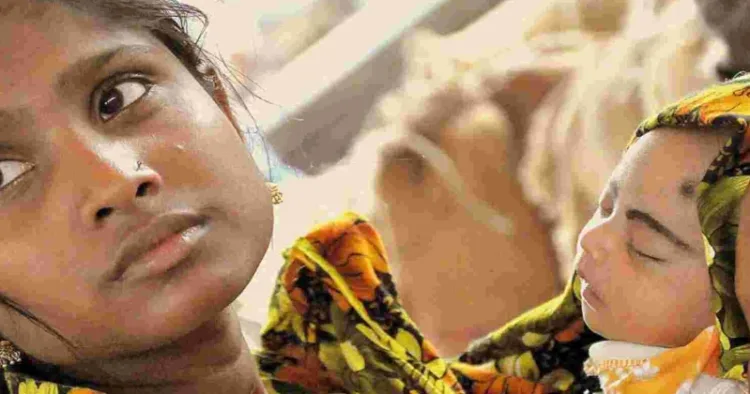A recent study by the Tamil Nadu Directorate of Public Health has raised concerns over the increasing number of child pregnancies in the state, highlighting it as a significant health threat to teenagers.
According to the study, authored by R. Vijayakumar and published in the Public Health Journal, while overall pregnancies in Tamil Nadu declined from 10.2 lakh in 2019-20 to 9.5 lakh in 2023-24, teenage pregnancies have shown a worrying rise. The data reveals that pregnancies among girls aged 13-19 increased from 11,772 in 2019-20 to 14,360 in 2023-24. This marks an increase in teenage pregnancies from 1.1 per cent of total pregnancies in 2019-20 to 1.5 per cent in 2023-24.
The study attributes this rise to several factors, including early marriages, community and social pressures to marry, sexual abuse, and a lack of awareness about sex, reproductive health, and the consequences of early pregnancies. It also points to issues such as miscarriages, wrong medication taken under coercion, and exploitation by partners or relatives.
The report highlights that many teenagers, due to infatuation or natural physical attraction during adolescence, unknowingly engage in relationships, mistaking them for love. The lack of proper education about reproductive health further exacerbates the problem.
Teenage pregnancy continues to be a pressing concern in Tamil Nadu, particularly among antenatal mothers, according to Director of Public Health Dr. T.S. Selvavinayagam. Speaking to the media, Dr. Selvavinayagam emphasised the significance of addressing this issue, which poses serious health risks for adolescents.
The study, conducted by the Directorate of Public Health, analysed data from the Health Management Information System portal, covering a vast cohort of 4.9 million antenatal mothers between April 2019 and March 2024.
Key findings reveal a steady rise in teenage pregnancies over the years, despite an overall decline in total pregnancies. The total number of pregnant mothers in Tamil Nadu for the years 2019-20 to 2023-24 was recorded as follows:
- 2019-20: 10,25,858
- 2020-21: 10,00,683
- 2021-22: 10,09,521
- 2022-23: 10,02,006
- 2023-24: 9,54,942
During the same period, the number of teenage pregnancies increased annually:
- 2019-20: 11,722 (1.1 per cent)
- 2020-21: 12,606 (1.3 per cent)
- 2021-22: 13,447 (1.3 per cent)
- 2022-23: 10,685 (1.1 per cent)
- 2023-24: 14,360 (1.5 per cent)
The study’s findings highlight a concerning trend, with teenage pregnancies rising from 1.1per cent of total pregnancies in 2019-20 to 1.5 per cent in 2023-24.
The Fifth edition of the National Family Health Survey (NFHS) 2019-20 reveals that nearly 6per cent of girls aged 15-19 in Tamil Nadu have either had a child or were pregnant with their first child. This figure remains consistent with the findings of the previous Fourth edition of the survey, indicating a persistent challenge in addressing teenage pregnancies in the state.
According to the report, Tamil Nadu recorded 62,870 teenage pregnancies, resulting in a cumulative teenage pregnancy rate of 1.3per cent. The study highlights significant regional disparities:
- Nagapattinam: 3.3 per cent
- Theni: 2.4 per cent
- Perambalur: 2.3 per cent
- Kancheepuram, Virudhunagar, and Chennai: Lowest rates, ranging from 0.4 per cent to 0.7 per cent.
Dr. Vijayakumar, who contributed to the study, emphasised the long-term consequences of early childbearing, stating, “Early childbearing can derail a girl’s otherwise healthy development into adulthood.”
Healthcare professionals echo these concerns, particularly for victims of sexual assault. Doctors note that such victims often face severe psychological and social repercussions, including withdrawal from society, loneliness, social stigma, and fears about future relationships and motherhood.
Some gynecologists advocate for raising the legal marriage age for women to 21, aligning it with the legal age for men. Alternatively, they suggest increasing the legal age to at least 19 years. They also stress the importance of incorporating sex education into school curricula to address the root causes of teenage pregnancies.
The Protection of Children from Sexual Offenses (POCSO) Act has been instrumental in enabling doctors to report child pregnancies to the police and district child welfare agencies. Medical professionals also recommend terminating such pregnancies within the safe period when appropriate and providing comprehensive antenatal care to affected adolescents.
Dr J Nirmalson, co-author of a recent study, has raised alarm over the health risks associated with teenage pregnancies. “While there is no specific data from Tamil Nadu yet, medical literature indicates that stillbirths and newborn deaths are 50per cent higher among infants born to teenage mothers compared to those born to mothers aged 20-29,” he stated.
Supporting this concern, data from an RTI reply obtained by activist A. Veronica Mary in February revealed that underage pregnancies were reported between January 2021 and December 2023. The data, sourced from government medical college hospitals, shows that Dharmapuri reported the highest number of underage pregnancies compared to larger cities like Chennai, Coimbatore, and Madurai.
An RTI query has revealed that a staggering 8,742 underage pregnancies were reported in government hospitals across 15 districts in Tamil Nadu over the past three years. Dharmapuri accounted for the highest number, with 3,249 cases, followed by Karur and Vellore in second and third positions, respectively. Activists estimate the numbers could exceed 10,000 if data from primary health centres and private hospitals were included.
C. Prabhakar, an RTI activist, highlighted alarming trends in Tiruchy district. In 2021, the district ranked third for teenage pregnancies in the state, moved to second in 2022, and became the highest reporting district in 2023. Between April 2023 and March 2024, 654 teenage pregnancies were recorded in government and private hospitals in Tiruchy alone.
While growing awareness through social media, educational literature, and lessons on sexual health has helped teenage girls understand the importance of consent and the dangers of early pregnancies, challenges persist. Experts warn that teenage pregnancies severely impact physical and mental health, with long-term repercussions on overall well-being.













Comments